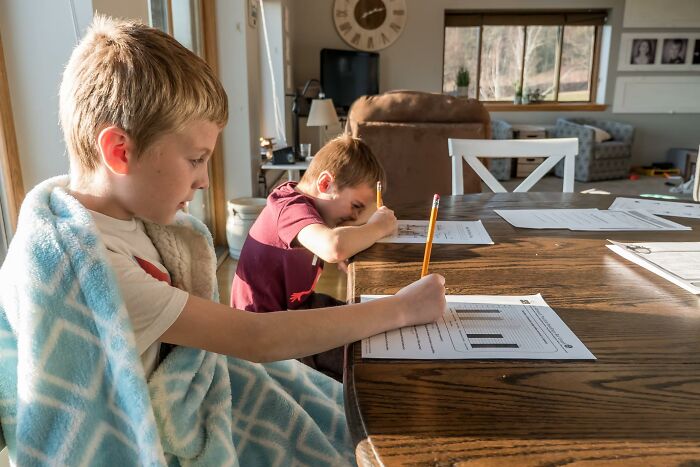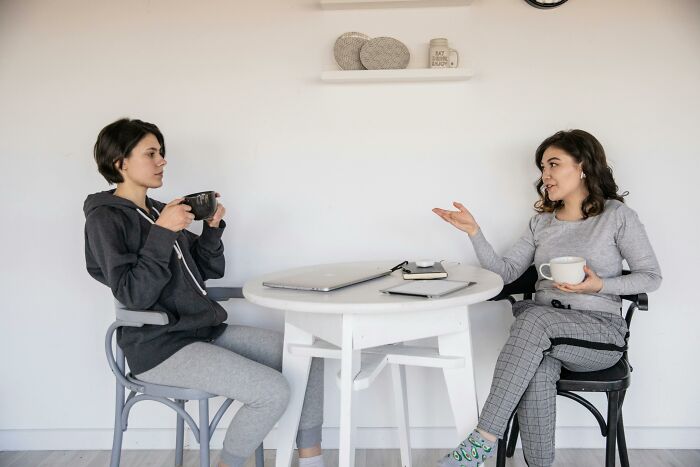Article created by: Mindaugas Balčiauskas
According to Alex Lickerman, M.D., who is the author of The Undefeated Mind: On the Science of Constructing an Indestructible Self, control over our lives is something we all want, but in a universe in which everything is mutually interdependent, none of us entirely have it over anything, including, much of the time, ourselves.
Rather, what we all have in abundance is influence: the closer personally and physically others are to us, the greater our influence over them, and vice versa. Curious about the extent of this, Reddit user Kaushman2 asked other people on the platform to share the most effective psychological tricks they've ever used. Here are some of the most popular answers.
Giving a friend's child (10 yo) an illusion of choice to get them to do something you want them to do. So instead of saying "put your socks on", say "do you want these socks, or these ones". Or same for dinner. Not "Eat your dinner". Ask, "do you want peas or brocolli?" They feel ownership of their choice and some control in their life. Kids in general, have very little control over their lives and they need practice to make decisions.
When my kids were younger if I thought they were lying, I would ask them to stick out their tongue. They thought I could tell from the colour of their tongue whether they were lying or not.
In reality, it was that they would hesitate before sticking out their tongue that told me if they were lying or not.
Tell your kids that chores will be done after your nap and they will let you hibernate through the winter without any distractions.
When upset callers would rant and start to curse and yell, I'd interrupt with "Wow, I am really sorry that you feel you have to talk to me this way in order for me to help you. You don't, but I understand. I'll let you talk and then I am going to help you. I am sorry I interrupted you; you were saying?
They would either apologize, chance their tone or hang up. I was fine with either one.
I worked at an insurance agency where a lot of customers were crabby or rude. I’ve rented in the area for a decade, so I’ve gotten familiar with all of the parks in town. I’d look at their address and say “Oh! You live right by Kingston Park. I walk my dog there all the time!” Their attitudes did a 180. They didn’t want to be jerks to somebody they might encounter in real life.
One of my favorite tricks I use on myself is, when I can't sleep, I just curl into the most comfy position, close my eyes and pretend really hard that it's 6 am and I have to get up. I don't know why, but it makes me fall asleep real quick.
When someone is yelling at you in public, I always remain calm and nonexpressive. Not giving them the reaction they want and escalating makes them feel/look goofy.
Toss a coin to reveal how you feel about a decision. if you wish it went the other way, do the other thing. if it's "oh, yeah, that's fine", stick with the coin.
Acctualy this one came in my minde -To avoid workplace drama and be well liked is to just compliment people behind their back.
When getting a client's background (social services) and they bring up their kids, ask to see a photo or ask something that triggers a proud parent response. Accelerates the process of building trust.
If you want someone to like you, ask them for their opinion or help in something you know they are good at.
People like to feel important and needed, so you fill a need by asking, so they automatically view you positively. It also opens them up, even many shy people will open up if it is something they enjoy or are talented at. You meet some great people this way.
Bonus, you can see how they treat people while in a position of "authority", which will help you decide if you want to continue to build a relationship. .
Not sure how well it actually works, but one good one is saying thank you instead of sorry. Like ”thank you for waiting” instead of ”sorry for being late”. It draws attention away from the negative.
I tell my husband when my teacup is full. This is how I imagine my ability to regulate my emotions and how likely I am to snap at someone. I'll say stuff like, "My teacup is almost full but I'll do my best." When I'm overwhelmed I can say my cup is full and he immediately understands what I mean and what that means for a while.
We use this with our daughter to some success, where she can at least identify when she's getting overwhelmed before it hits the peak. Then we move into how we can best empty our cup in a way that's not overwhelming, and doesn't make others feel bad. After all, screaming might empty our cups quickly, but we're just pouring that energy into someone else's cup.
The best part is that because I've used this pretty consistently, I have a better feel for how much emotional bandwidth I have at that moment and can be honest with friends and coworkers, "I really want to hear this story, but I don't have much room in my cup. Give me 5 minutes to take a quick break and when I come back I'm all ears." It's been great and I feel like my relationships have gotten better.
Seasickness cure Only works on others (won’t work on yourself or anyone you tell the “secret” to). Tell the person experiencing seasickness they need to eat an orange (or any other available random thing, oranges or other citrus works well for the explanation.). Explain that they cure sea sickness and that’s why pirates and all the other explorers used to seek them out and always made sure they had some on the ship. Now the psychology behind it is that nothing truly cures sea sickness but it is mostly caused from your mind being confused by not seeing the horizon correctly. Basically telling the person that an orange or whatever you recommend they eat / drink causes them to experience the placebo effect and their brain believes the problem just went away. Used this successfully 5 or 6 times with complete strangers and also on my wife. When we got back from our latest excursion my wife was the one to repeat it to someone else. Still works for her too.
Under promise and over deliver.
Asking "would you be opposed to doing X?" instead of "would you be willing to do X?".
At work, when I want a particular outcome from a boss, I don’t ask them if I can do a thing. I state that I’m doing a thing (and give a reasonable reason why), and then ask them to let me know if they have any objections.
I now get to do far more of what I want than before.
My "dad voice". It's amazing how hard it can jolt people. I think the funniest use though was playing volleyball. I'd just boom out "mine!" and the other team would all step away from the ball.
I have harnessed the power of positive reinforcement. Instead of focusing on what is wrong, I make a conscious effort to highlight and praise the positive behaviors or traits of others.
When someone does something you like, reward them. Much in the sense of “good boy” for a dog. So if they say something you like “I like how you said that!” Or “that’s a good question”. It’s really just positive reinforcement, but it works really well especially in the work place. For instance, “I really like the way you write that report” or “thank you so much for noticing that. I admire that you’re able to do that and it’s helpful”. People often forget to just compliment people and when you learn to give people meaningful compliments you’d be surprised how much easier life will go socially and professionally.
Another one I’ll say is, a few weeks into a new job, bring donuts or cookies or something. It’s a good gesture that will help get people to like you, especially if you got off on a wrong foot.
When someone is raising their voice at you, lower yours in volume rather than raising yours to match.
I used this technique at University where I couldn't stand the thought of having to answer questions in front of a group of people. So if you find yourself in a group situation where someone (a leader, tutor, manager etc) is asking questions that must be answered and you want to avoid being picked so that you don't have to talk, then here is my tip. If the person locks eyes on you as they ask the question, then just as they are about get to the end of their question you break eye contact and look towards another person in the room and hold it. Their attention is diverted to that other person just as the question ends and the person they are now looking at feels compelled to answer. If however the person starts asking the question while looking at someone else then look at that other person and hold it so you can't get suckered. Use it sparingly because if you do it enough on the same person, they will be on to you.
Mirroring body language. This works super well when meeting someone for the first time, as it subconsciously puts the other person at ease.


























